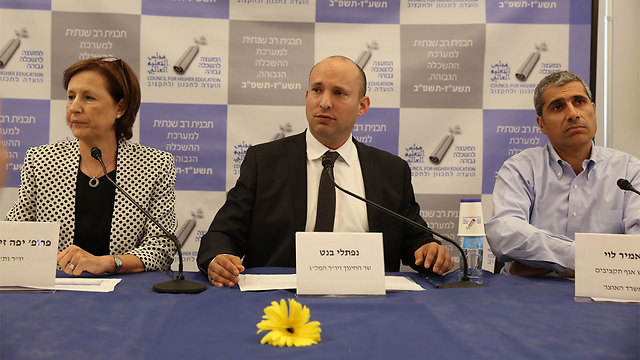Education Minister Naftali Bennett has presented a six-year plan to improve higher education in Israel and bring all sectors of Israeli society, including the ultra-Orthodox, Arab and those from the periphery, to higher education. The plan also seeks to strengthen the humanities’ prestige and entice more world-famous Israeli researchers to return to the country.
Minister of Education Naftali Bennett (Bayit Yehudi) presented on Tuesday a six-year budget plan for higher education.
Speaking at a press conference, Bennett was joined by the Council for Higher Education’s Planning and Budgeting Committee Chairman, Prof. Yaffa Zilbershats; Chairman of the Association of University Heads, Prof. Peretz Lavie; Chairman of the Natinal Union of Israeli Students Gilad Arditi; and Director of Budgets Department in the Ministry of Finance, Gil Levi. The minister presented eight central points that comprise his plan, the first of which is the addition of two billion shekels to promote research infrastructures and to encourage research and scientific excellence.
The second is 120 million shekels for innovation and improvement in teaching, in part through grants to produce various courses.

The plan also includes the intention to increase the number of international students from 12,000 to 25,000 by 2022, increasing the number of faculty members of students with an emphasis on engineering and computer science, and allocating billions of shekels to expand the accessibility of higher education to the ultra-Orthodox and Arab sectors, as well as for the advancement of women and Israelis of Ethiopian descent.
The plan allots 100 million shekels to promote the humanities in various institutions of higher learning, as their prestige and demand for them has been in sharp decline in recent decades. Inter alia, the money will be allocated to digitizing studies and attracting doctoral candidates.
According to data presented at the press conference, the base for the higher education budget in 2016 is 10 billion shekels, and it will henceforth increase with each year: by NIS 449 million in 2017, NIS 723 million in 2018, NIS 1 billion in 2019 and so on until reaching NIS 1.8 billion in 2022.
Lavie said that the institutions had suffered in recent years from a serious dearth of budgeted funds: “When we want to bring back a researcher who’s at a university in the United States, he’s ready to pass up the American salary, but he wants the same laboratories that he has there. For that, the universities are crying out for budgets. I think that now we can return to the country those Israeli researchers who have acquired a global reputation for themselves.”
Zilbershats said that the multi-year plan constitutes a large achievement and will allot the highest ever budget for higher education. She added that the plan would “also promote research in the natural sciences, in Judaism, in the social sciences and in the humanities.”
Bennett said, “Higher education has a central role in keeping a relative advantage for the State of Israel. The future of the State of Israel is dependent on it. In the six-year plan, we’re setting a higher bar, and one of the goals is to narrow the gaps in Israeli society. We’ll know that we’ve succeeded when the next Israel Prize laureate comes from Sderot, when the Faculty of Medicine in Tel Aviv will be full of students from the periphery. Then we’ll know that we’ve met the bar.”
As reported by Ynetnews
